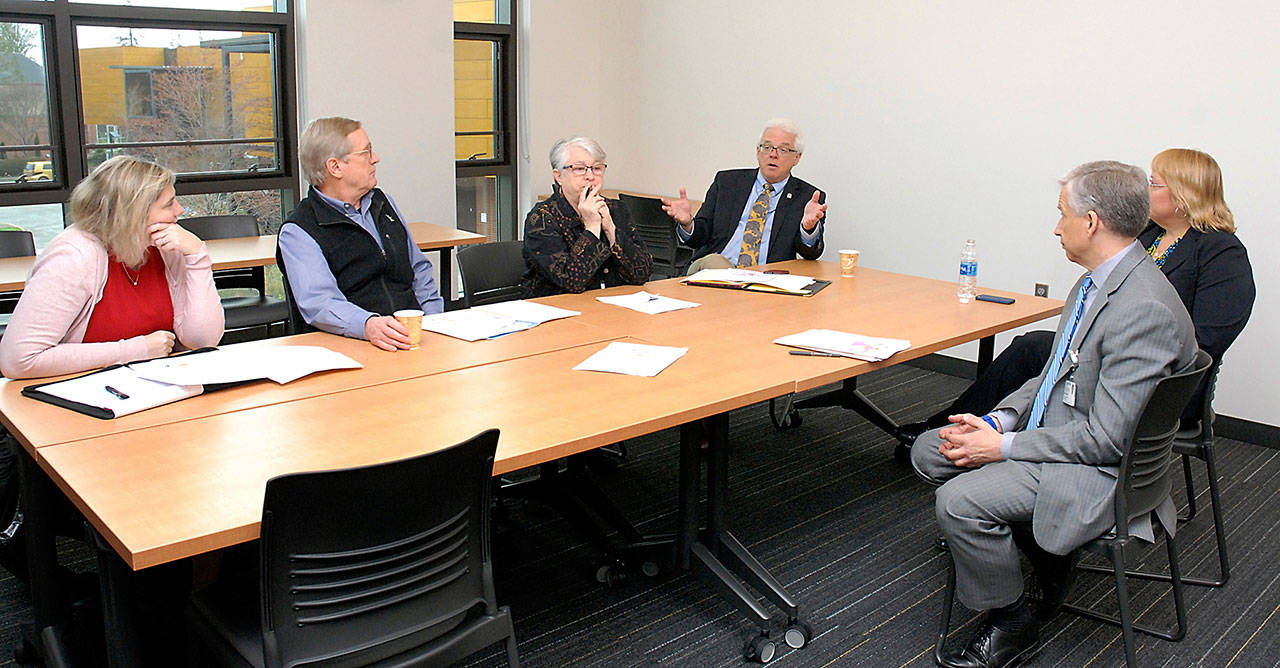Peninsula College is teaming up with health care providers from Clallam and Jefferson counties in a wide-ranging $1 million effort funded by state lawmakers, the college foundation, local hospitals and others.
The goal: Add registered nurses, medical assistants and certified nursing assistants to a rural medical industry workforce on the North Olympic Peninsula that is typically starving for job applicants.
“To recruit doctors is challenging,” Olympic Medical Center CEO Eric Lewis said on April 6.
He commented in a group interview in which college, OMC and Jefferson Healthcare officials and 24th District state Rep. Steve Tharinger of Sequim discussed the initiative.
“To recruit medical assistants and RNs, the workforce is not there, so it has to be trained,” Lewis said. “We have to create it.”
Interview participants hope the public-private collaboration will prove successful as a pilot project.
Tharinger said the partnership between the state Legislature and the North Olympic Peninsula funders to expand workforce education is one-of-a-kind.
“It’s not happening anywhere else in the state,” Tharinger said. “What’s unique is having local partners share the cost.”
Details of local funding are still being worked out, participants said.
The additional funding for health-provider training so far is fueled primarily by a $437,000 allocation for the 2018-19 and 2019-20 school years, approved by state lawmakers March 8 in the supplemental operating budget, that consists of $87,000 for 2018-19 and $350,000 for 2019-20.
The effort also is being bolstered by annual allotments, for four years, of $60,000 from OMC and $40,000 from Jefferson Healthcare.
Bill and Esther Littlejohn of Sequim have donated $50,000 for the 2018-19 school year, and the Jamestown S’Klallam Tribe is allotting $10,000 annually for three years.
The Peninsula College Foundation is helping students with $45,000 in scholarships for newly enrolled medical assistant students for fall 2018 and $51,150 in scholarships for new and returning students in all Allied Health instructional areas for the 2018-19 academic year.
As part of the students’ training, on-the-job, clinical-placement experience will be provided by OMC, Jefferson Healthcare, the Jamestown S’Klallam Tribe and Forks Community Hospital.
Clinical placement also will be provided by Crestwood Health and Rehabilitation Center and Peninsula Behavioral Health in Port Angeles and Dungeness Courte Memory Care in Sequim.
Under the program, the annual number of slots available for students pursuing a two-year registered-nurse degree, achieved under Peninsula College’s Allied Health Program, will increase by 33 percent beginning in September, from 24 to 32, college President Luke Robins said last week.
Fifty-seven students applied for entry into the college’s RN academic program for September and only 24 slots were available, according to college records.
“We need to try to do more in terms of increasing capacity,” Robins said. “We need to ramp up the program on the front end.”
Students mostly from Clallam and Jefferson counties attend Peninsula College, college officials said.
Annual medical-assistant student enrollment will double from 20 to 40 beginning in September for that 15-month program, while certified nursing assistant enrollment will increase from 40 to 80 students for the three months of training required for certification.
Two nursing instructors and a medical-assistant instructor will be hired to teach the additional students through the 2019-2020 school year under funding approved by the state Legislature March 8, Robins and representatives from Olympic Medical Center and Jefferson Healthcare hospital said.
Full hiring calls for eight new employees, including three new instructors and two lab technicians, according to the state Department of Health. All but $54,000 of the $450,000 annual cost will consist of salaries and benefits, with 1.25 FTE for a nursing instructor penciled in for $90,000 and a full-time medical-assistant instructor costing $60,000, according to DOH.
Tharinger said he was “pretty confident” that the state Legislature will continue funding the program beyond two years.
Robins said additional revenue also will be generated by added tuition.
“We’ll continue to invite partners to help out as we move forward,” Robins said in an text message late on April 6.
The state Department of Health has designated Clallam and Jefferson counties as “medically under-served areas” based on infant mortality, poverty rate, percentage of elderly and the ratio of primary care physicians to the population, according to the agency’s’s eight-page report on the workforce initiative.
The counties also are in the highest category for professional shortage areas and have populations in which 21 percent-26 percent of residents are 65 and older, according to the agency.
Interview participants waxed enthusiastic about the program in a meeting room at the college’s new 47,000-square-foot, $25.6 million Allied Health and Early Childhood Education Building, which had its grand opening May 21 and will house the additional students and teachers.
Attendees included Caitlin Harrison, Jefferson Healthcare chief human resources officer; Sharon Buck, Peninsula College vice president for instruction; and Mia Bowser, Peninsula College dean for professional, technical education and e-learning.
The 24th District covers Clallam and Jefferson counties and the northern half of Grays Harbor County.
“That’s one of the reasons I was able to get these dollars, because we have this partnership,” said Tharinger, who is running for re-election in November.
He serves as chairman of the House Capital Budget Committee and is on the House Health Care and Wellness Committee and Appropriations Committee.
“It’s not just the state putting in all the money,” he said.
Harrison and Lewis said the need for the health care workers who will be trained by the program could not be clearer.
The hospitals are never fully staffed, they said.
OMC has 25-30 openings for registered nurses, a number that remains constant.
That forces OMC to hire “travellers,” or registered nurses from out of town whose expenses the hospital must cover.
“We just have an ongoing need,” Lewis said.



